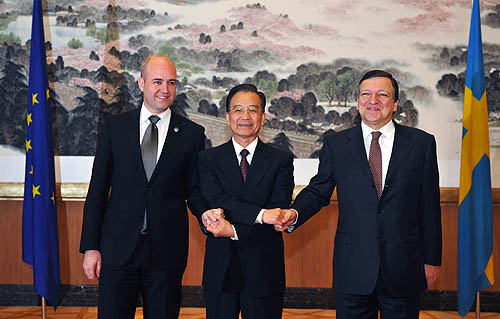|
At the same time, he called on the EU to relax its export controls over hi-tech products to China.
 |
|
A SHOW OF UNITY: Chinese Premier Wen Jiabao (center), European Commission President José Manuel Barroso (right) and Swedish Prime Minister Fredrik Reinfeldt pose at the 12th China-EU summit in Nanjing on November 30 (RAO AIMIN) |
China has sent about 10 trade promotion missions to Europe since the financial crisis broke out last year, according to MOFCOM. Most recently, a group of some 300 Chinese entrepreneurs visited Serbia, France, the Netherlands and Ireland from November 21 to December 4. They toured these countries to explore business opportunities in a wide array of sectors such as energy, aviation, automobiles, finance, telecommunications and environmental protection.
The EU is China's most important partner in technological cooperation. By September, China had signed $125.2 billion in technology import contracts with the EU, according to MOFCOM.
Regarding some Western countries' calls that the Chinese currency should appreciate, Wen said it is unfair that these countries pressure the yuan to appreciate while practicing trade protectionism against China. "In fact these measures are restrictions on China's development," he said.
Against the backdrop of the financial crisis, a stable yuan is conducive both to China's economic development and to world economic recovery, he said. China will improve its exchange rate regime to maintain the stability of the yuan at a reasonable level, he said.
In a joint statement released following the China-EU summit, the two sides pledged to promote sustainable economic growth by "fighting all forms of protectionism, keeping open and free trade and strengthening support for developing countries."
"There is a strong unity of opinion between China and Europe that we need to fight protectionism and we need to keep the trading system working and open," said Mikael Lindstrom, the Swedish Ambassador to Beijing.
A stronger yuan may not help reduce the EU's trade deficit with China, because products of European-invested companies in China account for a large proportion of Chinese exports to Europe, said Zhang Yansheng, Director of the Institute of Foreign Economics at the Academy of Macroeconomic Research under China's National Development and Reform Commission.
Moreover, he added, the yuan's real exchange rate has actually been on the rise due to soaring labor, energy and environmental protection costs in China.
New dimensions
Held only one week before the opening of the Copenhagen climate change conference, the China-EU summit put the spotlight on environmental issues, said Feng Zhongping, Director of the Institute of European Studies at the China Institutes of Contemporary International Relations.
The EU has taken the lead worldwide in addressing climate change and developing a low-carbon economy, he said. In his view, the potential for cooperation between China and the EU on environmental protection and new energy is huge.
At the China-EU summit, for instance, the EU pledged up to 57 million euros ($86 million) to a project aimed at helping China develop power generation technology with minimum carbon dioxide emissions.
China and the EU will work together with other parties for a "comprehensive, fair and ambitious outcome" at the Copenhagen climate change conference in line with the principle of "common but differentiated responsibilities" adopted by the UN Framework Convention on Climate Change, said their joint statement.
In fact, the Chinese Government announced that it would cut its carbon dioxide emissions per unit of gross domestic product by 40-45 percent by 2020 compared with 2005 levels shortly before the China-EU summit. In Feng's view, the move helped create a congenial atmosphere for climate change discussions at the summit.
China hopes the EU will set up an example for developed countries by drastically reducing greenhouse gas emissions while meeting developing countries' needs for funding and technology transfers, Premier Wen said. The Chinese premier is scheduled to attend the UN climate change conference in Copenhagen, Denmark, in December.
| 